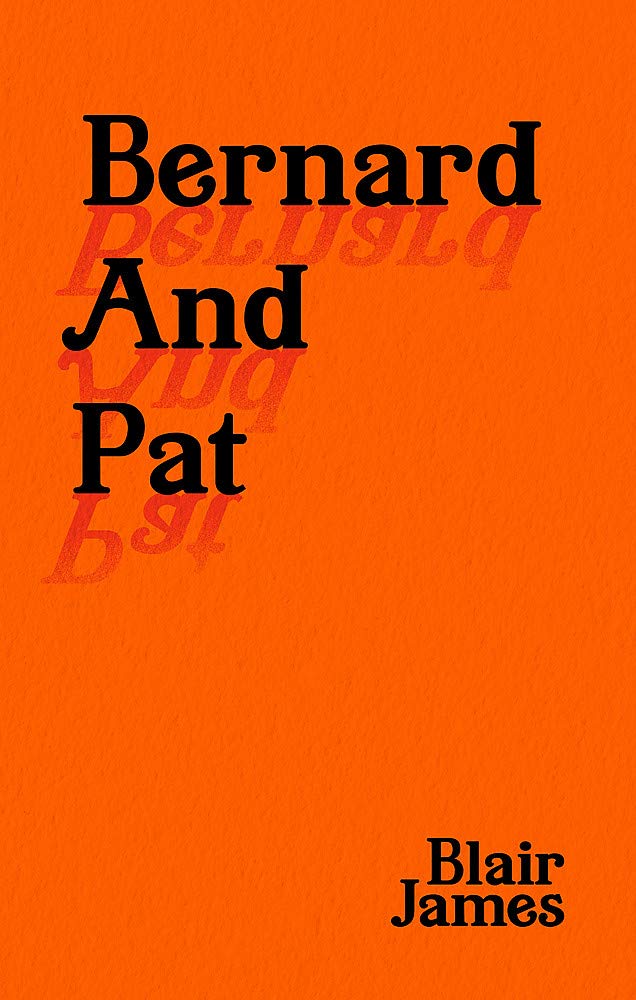I listened to the songs, and I didn’t know the words. I bowed my head where everyone else bowed theirs. I stood and sat on cue. And at one point, during a song, I turned my head to look at Lucy. I looked at her and her eyes were closed, and I don’t think I’ve ever seen such a vision of ardent faith. She looked as though she was not on this plane, but another, better and more peaceful one. Her face looked so beautiful. Pious. And it brought tears to my eyes to see someone so lost in love and belief and happiness. And I found it so admirable for her to have so much faith in something, when I had none in myself, or in anything.

If you like Eimear McBride, you will love Blair James.
I think Bernard and Pat might be the saddest story I have ever read.
Catherine’s life has been defined by two events: the death of her father when she was five and the time she spent as a child in the home of Christian childminders Bernard and Pat. We never learn what age Catherine is as she writes; we know only that in many ways she is still that child, still trapped inside that house.
One of the central questions asked by the book is not so much will Catherine escape from that house, but is escape from what happened there ever even possible?
There are other books that deal with child abuse and trauma but Bernard and Pat is made exceptional through the manner of its telling. James’s narrative unfolds through a series of vignettes, some several pages in length, others as brief and fleeting as a single line. The timeline is elastic and infinitely fluid, shifting and switching between Catherine’s fragmented memories of her beloved father – indeed she later questions if these are her own memories, or simply anecdotes she has heard so many times they have the feeling of memories – her partially-blanked recollections of Bernard and Pat, her uncertain, jagged present. Our understanding of ‘what happened’ is arrived at gradually, through a process not unlike stacking building blocks, or putting together a jigsaw puzzle: a particular piece may not make sense until we come upon the piece that fits beside it, sometimes many pages later.
The language of Bernard and Pat is what sets this book in its own category and above many others. Catherine’s voice is not a child’s voice, and little Catherine is not a child narrator. Rather, it is the juxtaposition of the hurt, damaged, unadulterated clarity of childhood perceptions with the mature vocabulary of the adult Catherine, someone who reads, concludes, remembers that makes an encounter with Bernard and Pat, more than anything, like reading a collection of poems.
The shattering of self, the helplessness, above all Catherine’s loneliness is palpable on every page.
Reading Bernard and Pat felt energising, exciting, like a blessing in the way that discovering such a fresh, original and dynamic literary talent always does; at the same time it felt and still feels almost unspeakably painful, like witnessing a terrible accident that can never be put right.
The concise nature of this book means you could easily finish it in a single sitting, yet its interior space is so large you will never entirely encompass it, or stop wanting to revisit it. In this also it is like poetry.
Blair James’s willingness and ability to convey ambiguity – not just the ambiguity surrounding events but the ambiguity surrounding character – is both necessary and daring. Catherine’s circumstances are not those of abject poverty, of a shocking one-off crime that makes newspaper headlines. Rather they are a slow accretion of need, of time stretched to breaking point, of carelessness, exhaustion, making-do, lack of insight or thought. James somehow finds the artistic bravery to make Bernard himself an ambiguous character, a minotaur who is half pathetic inadequate, half predatory monster.
This is not just truth-telling, this is great writing.
I referenced Eimear McBride at the top of this page. You might well read Bernard and Pat and think of McBride’s groundbreaking debut A Girl is a Half-Formed Thing, but for me James’s novel equally shares elements of tone and structure with her more recent book Strange Hotel, which I read at the close of last year and loved so much it would have had a Girls Against God spot all to itself, had my encounter with it not coincided with best-of-year lists and all that stuff. Strange Hotel delivers its denouement through a list of place names, a formal flourish I found so joyous both as style and substance it still lifts my spirits when I think about it. I was not hoping for such a moment of closure from Bernard and Pat, yet in its final two brief pages – in its final word – there is, after all, something approaching if not consolation then at least a spark of hope. Brava.
I always look forward to the debut novelists feature that appears in the Observer towards the end of January. This year’s selection feels particularly noteworthy, important and progressive. There isn’t a single book on the list I wouldn’t be interested in reading, and I am especially gratified by the emphasis on more experimental forms. If I could, I would add one more name to this list and that name would be Blair James. Bernard and Pat is devastating, intense and brilliant. I cannot wait to see where James takes us next.